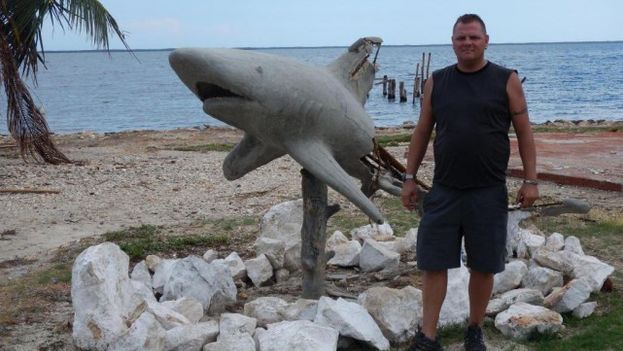
![]() 14ymedio, Havana, 3 October 2017 — Carl-Michel Cloutier, a Quebecois married to a Cuban and a frequent traveler to the island, plans never to return after his last experience. The Canadian was arrested, interrogated, had his belongings confiscated and was threatened with prison and never leaving the country, after coming to the island with humanitarian aid for the victims of Hurricane Irma.
14ymedio, Havana, 3 October 2017 — Carl-Michel Cloutier, a Quebecois married to a Cuban and a frequent traveler to the island, plans never to return after his last experience. The Canadian was arrested, interrogated, had his belongings confiscated and was threatened with prison and never leaving the country, after coming to the island with humanitarian aid for the victims of Hurricane Irma.
The Canadian newspaper La Presse reported Cloutier’s story Monday, after his return to Montreal. In the article he said he had experienced an “ordeal” because of the Cuban authorities. “I thought I was going to end up in prison,” he said.
To avoid any problems, Carl-Michel Cloutier had informed the Cuban embassy in Canada of his intentions to bring aid to Cuba and asked that it be exempt from customs duties when he arrived in Havana on September 21.
Without offering any guarantees, Mara Bilbao Díaz, Cuban Consul in Montreal, provided him with a document stating that he was carrying 15 bags of 25 kg each with “a load of donations of clothing, toys and canned food for the victims of Hurricane Irma in the village of Isabela de Sagua, in the province of Villa Clara.”
“Mr. Cloutier was duly informed of Cuban customs regulations regarding passenger imports. Please use this document as an informative note,” the official wrote in the letter.
The Canadian arrived with a friend, Patrick Ménard, with 19 suitcases of aid to distribute, but he was only allowed to take nine of them with him, after paying 100 Cuban convertible pesos (roughly $100 USD) at customs. The other 10 suitcases stayed at the airport.
Cloutier’s wife’s family lives in the province of Villa Clara, near the village of Isabela de Sagua, where 70% of the buildings were destroyed by the hurricane on 9 September. In order to help the victims, donations were collected in Cloutier’s neighborhood, well as at the Albert Schweitzer School and Viajes LM, in Saint-Bruno-de-Montarville, Quebec.
Carl-Michel Cloutier and his friend distributed some of the donations last week in the village. “The devastation was extreme, the houses were completely flattened or destroyed by the hurricane,” he told the Quebec daily. “The families were trying to pick up what was left, people were sleeping in a bed with their children, in the middle of their house without a roof or walls,” he said.
“We have shared the donations and they have shared their stories with us. They were very grateful, but it was very difficult for Patrick and me to witness this human tragedy.”
The problem came during a traffic control stop, when the two men and Cloutier’s parents-in-law were arrested by police and taken to the police station where they confiscated their phones and cameras.
“A man in military uniform from the Department of Immigration and another in civilian clothes from State Security interrogated me for more than four hours about our visit and the assistance we had delivered,” says Cloutier. “They told me that it is illegal to make humanitarian donations without going through the government.”
As the Quebecois explained it, the atmosphere was very tense during the interrogation, which took place in a harsh tone. “They treated me like a criminal,” he says.
Expressing himself as best he could in Spanish, he managed to make his interlocutors understand that he had a document from the Cuban consulate in Montreal explaining his intention. They accompanied him to his in-laws’ house to look for it and after six hours he was released.
Still in shock, Cloutier and Ménard went quickly to Varadero, where there is a Canadian consulate, but a day later they received a call telling them that the police required them. They had to meet with the authorities or they could not leave the country and his in-laws were threatened with arrest.
“We had a lot of stress before Canada’s consulate staff confirmed, 24 hours later, that we would have no problem with the law,” he says.
Following this experience, Cloutier advises other Quebecois against traveling to Cuba. Some of them have apparently expressed their intention to come to the aid of the victims.
La Presse tried to contact the Cuban embassy in Ottawa to gather information on the incident, but the diplomatic headquarters ended the conversation by saying that all visitors to Cuba must comply with the rules. They never offered more details despite promising the newspaper they would.
A spokesperson for Global Affairs Canada wrote: “It is not advisable to travel to Cuba with donations without first making firm arrangements through an official partner. Cuban customs may confiscate any imported object that they do not believe to be for the personal use of the tourist and can impose high tariffs on luggage weighing more than 30 kilos or for medicines that exceed 10 kilos.”
The Department emphasized that the best way to help people affected by the tragedy is to provide cash donations to humanitarian organizations already active in the field.
